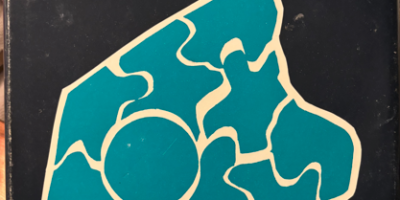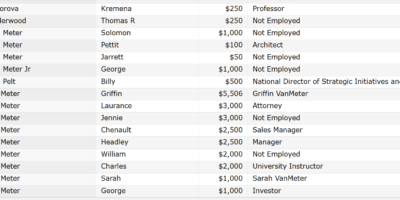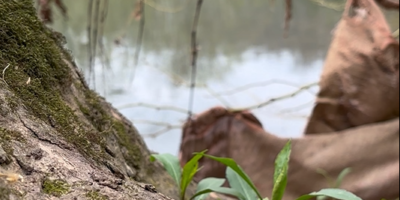Late-submitted notes from Lexington, KY, the longest continuously running occupation in North America.*
“The city now known as Lexington, KY, is built of the dust of a dead metropolis.”
George Washington Ranck, History of Lexington Kentucky: Its early annals and recent progress(1872)
Monday, early
The caravan leaves, late, from Occupy Lexington at 9:48 AM for the Santa Clause press conference in the governor’s office 30 miles away in Capital City. Clause is in town to speak to Governor Beshear over what a recent North Pole press conference cited was “a litany of Christmas-killing coal initiatives that the Kentucky governor endorsed during his first term in office.”
We arrive in time to hear Steve Beshear’s office secretary tell Santa, some of his elves, a few media and Don Pratt that the governor will not be able to meet with them today. He is out of the office, does not carry a cell phone, and is generally and otherwise unavailable to hear what Father Christmas has to say. Undeterred, Santa merrily asks that Beshear receive the gifts of coal and switches he has brought.
After getting denied counsel with Kentucky governor, the assembled decide to walk the halls of government and sing Santa’s carols for all Kentucky politicians to hear. Unfortunately, not a single legislator they visit is in office, and no office provides a way for the jolly old Saint Nick to contact the legislators. But the assembled do sing, and all of the office subordinates accept Santa’s gift of coal. Everybody grabs the coal with tissues, despite the regular assurances from Elf Terry that this gift is “clean coal,” endorsed by their political bosses as safe for consumption by all Kentucky citizens. “No need for tissues here!” she says with a knowing smile.
About the time Santa leaves Frankfort, back in Lexington the regularly held noon foreclosure auctions at the downtown courthouse on North Limestone are mic-checked by a group from Occupy Lexington. Later, on Facebook, Karen will state, “The mic check was a success….until we were asked to leave.” If you want to see where abstract global financial capital hits the local pavement, there are few better places to be than at your city courthouse for foreclosure auctions. The process—selling people’s homes to a bunch of land-speculators with money stuffed in their pockets, all of this taking place on the steps of public property—encapsulates the many failures of the world we live in. Next Foreclosure Auction is January 9. Check out the Occupy Lexington facebook page for information on an action related to it. (Or just show up to the auction.)
Later that day
At the Libertarian Municipalism meeting, held as always on this night, 5:30 pm, at Occupy Lexington watering hole Natasha’s, we discussed strategy for our spring exchange. Tyler, Jaclyn, Jimmy and Danny were joined by group newcomers Jacob, John and Austin. The general idea is to use food as an anchor for a to-be-determined number of weekly markets. We want to choose a set location in a neighborhood, set up a stand there at a set weekly time, and exchange food that we grow and source. We hope to attract and organize other people to join us at this place and time to exchange other things—ideas, products, services, what-have-you’s.
At the meeting tonight, we decide that a separate agricultural space dedicated to growing our medium of exchange—veggies, hopefully lots of them—is needed, and that determining this agricultural space should take precedence over other actions. Growing time will be upon us before we know; we will need the winter to determine logistics, prepare our beds, et cetera, et cetera. We discussed a couple potential places and decided that parts of the January 2 and 9 meetings will be devoted to proposing, discussing and then choosing an ag space. Things to consider: location, size, access to our farming community and to needed agricultural tools. Other things? Drop in on the meetings and share your thoughts/spaces. We’ll make final decision on January 9. For a more full detailing of the meeting, Tyler’s notes will be added as an addendum to this Communite’ when they are submitted.
This reporter missed the GA again, more run-over from Lib Muni at Natasha’s. I’m told it was a 4-person assembly, with 2 of these people down from Detroit. Hard times all over seemed to be the prevailing sentiment of the day.
LGBL
Though the weather was pleasant for December, league play was halted. At Main+Esplanade, there were plenty of Occupiers this night, but nary a Bocce player in sight.
On the upside, the off-week allows me to reflect upon my victory in last week’s Lexington Guerilla Bocce League play.
Last Week
Match play commenced at 10:40 PM with the usual parade down Main Street from Occupy station camp to the LFUCG Memorial Fields, which face the new courthouse on North Limestone. Shaking hands and wishing each other a good bocce were Danny, Michael, Izzy and Dakota.
Play rotated around the upper and lower courthouse fields, with no roller taking control. As the players left the LFUCG fields and marched the Short Street Promenade toward the old courthouse next to Cheapside park, me and Dakota held a slim lead at 6 points; Izzy stood at 5, and Michael, seemingly sleepwalking through play, lagged behind with 2 points.
It was here, next to the Fifth Third Bank sponsored Lexington Slave Market, that Michael finally woke up. Throwing into a gentle down-hill east-rolling patch of grass, the native San Diegan bumped and ran his two balls snug against the Jack. Nobody could get closer, and the perfect botch, 3 points, propelled him up the crowded leaderboard into a second place tie with Izzy.
Play remained competitive throughout the old courthouse, with the lead changing hands several times. As the rollers crossed Main Street to throw in the concrete-walled raised beds, a tangle of vinca vines, that attempt to beautify the space between the 5/3 Bank building and its concrete parking garage next door, the score was all knotted up: 9-9-9-6. I broke the tie and took the match when I stuck my first ball in the vinca on the low-side of the Jack, a near-perfect throw that no other players were able to match.
With match play finished by midnight, the LGBLers shook hands, expressed “good bocce,” and then split for different climes: Izzy and Dakota back to a drizzly station camp, Michael and me to a warm Sidebar for a celebratory PBR.
Tuesday, early morning: Caves, banks and corners
The city is quiet this morning at 4:00 AM. Michael has taken this night off, a trade-off for my planned absence next Monday, the day after Christmas. Everyone else sleeps in the tents, save a homeless woman whose name I don’t know who has managed to establish a somewhat prostrate position across two of the fold-up chairs sitting under the camp’s lone canopy. I sit and read on the street corner, periodically trading Orwell’s Down and Out in Paris and London for Ranck’s History of Lexington, Kentucky and a number of old crispy newspapers that I never read last week.
I’ve got sleep on the mind, for good reason. The question of lodging, of where one may lay one’s head, threads throughout Orwell and Ranck’s narratives.
For Ranck, who recounts the establishment of Lexington in the late 1700s, where one laid one’s head had much to do with defensive positions. European settlers established their dominion over the land—slept relatively free of mind—by building walled forts made of downed trees nearby water sources. Lexington’s first stockade encampment, a bocce ball’s throw from where we played last week at the old courthouse, was chosen for its proximity to a running spring. As the city took root, settlers established dominion over their fellow European ruffians by planting corn and filling out deed surveys to be filed away across the mountains in the settled part of tidewater Virginia.
In Down and Out, Orwell describes a different relationship to home and lodging. In already-settled 1930s London, he is marched, daily, across the British landscape, part of an unofficial policy to force disempowered vagabonds to spend their days hiking from morning encampment to night-time respite. Reading last week’s paper, in which Lexington City Council Member (and my neighbor) Steve Kay claims that “we” don’t want a new homeless day shelter to open on MLK two blocks from Occupy Lexington, I can’t help but think that our leaders seem more interested in following the London model: keep those suckers moving. Morally reprehensible, sure, but it evidently makes Councilman Kay a great fan of the progressives in this city for which he speaks.
I have, myself, spent the past week as an intrepid interloper, though unlike Orwell it was neither forced nor hiked, and I didn’t have that asshole public representative Kay on my back talking about how much of a danger I may be to kids and others in my MLK neighborhood. I have spent the last few days paddling the Kentucky River, where for the past 3 centuries most any camping is by definition a form of trespass on someone else’s deeded property. On Friday night, Wes and I dined and slept in a cave perched 100 feet atop a broad bend in the river. Now private property, the cave was undoubtedly used as lodging by a number of publics over the years: Shawnee hunting parties, a bear-skinning Daniel Boone, 19th century kids from Valley View, and now us.
On the next night, we encamp on the banks of a Kentucky feeder stream. Under our tarp shelter, we warm ourselves by burning the fallen box-elders that litter the grounds surrounding us—technically speaking, a theft from some not-present landowner. As night approaches, a slight release that I’ve come to be familiar with: nobody will arrive to make us leave. We eat, our gazes looking down at the publicly available creek, and farther, across the creek to the several bottom fields still in productive cultivation.
Now, two days and 30 miles removed from those vagabond travels, I sit on the street corner, listen to the sounds of the city, and wonder at the connections.
Errata: In the wind
The Great Sign-In: This came out of conversations with Versailles Brad. Construct one great sign, using two or less words. Make it your all-time sign, to be brung by you when occupying. At a regular set time, say Wednesdays from 4:30-6:00 pm, stretch ourselves with our signs along Main Street, like one big great street poem about the world we inhabit or envision, told in lines of 1-2 words and art.
If you would like to have any information included in future Communite’s, contact Mayer.Danny@gmail.com. We’ll do our best to send out any messages over the Communite’ wire.
Humbly submitted,
Danny Mayer
Lex Oc 80/81
*Continuous European conquest and occupation of the entire North American Continent since 1492, excepted.




Leave a Reply